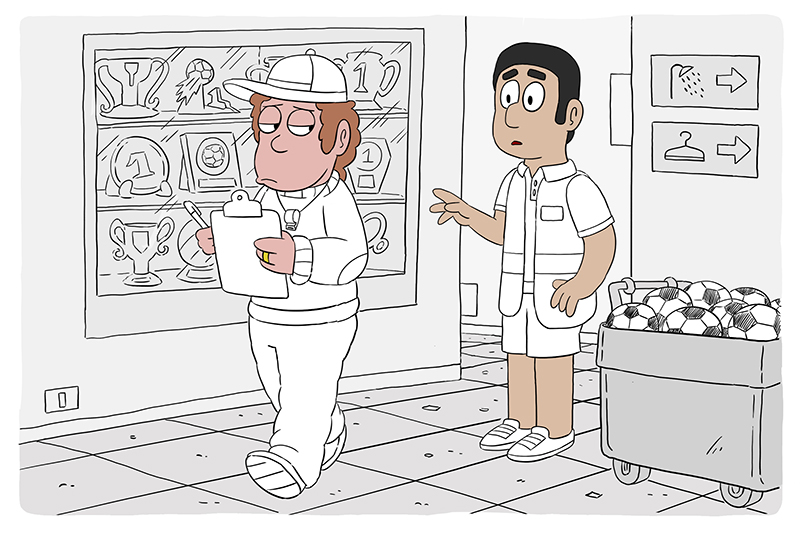
Zaid volunteers to help out at his son Nabil’s soccer club. He helps with training and gets along very well with the trainer Bart. One day Bart tells him he is getting married and invites Zaid to the wedding party.
Zaid was very happy for Bart, and of course he said he wanted to be there. But on the festive day, his brother Mahmoud suddenly stopped by to discuss family matters and he couldn’t leave it at that. The following week Zaid saw Bart again and enthusiastically congratulated him on his marriage. He also explained what had happened. But Bas reacted very irritated. Zaid doesn’t understand. “I thought we were new friends. Surely he understands that I can’t send my brother away?”
Bart is angry. “I felt really embarrassed. First he responds very enthusiastically and promises to come, and then he just doesn’t show up! I had told everyone he was coming and I had reserved a seat for him at a nice table. And then he doesn’t come, not even a phone call! Imagine, I thought we had become friends! And then that story about that brother….”
The connection
A man a man, a word a word. That runs deep in Holland. If you say yes, that’s a promise and people expect you to keep it. We take that into account. The extra chair, the food. In the Netherlands you agree in advance, sometimes weeks in advance, when you visit someone (even if they are family), and people stick to that planning.
The Netherlands is very organized. That goes a long way. It creates a lot of clarity, even though it is a pity that spontaneity is sometimes lost. But in the Netherlands, in the I-culture, you can also send away someone who comes unannounced. The appointment already made takes precedence. Unless there is an emergency, of course.
But in we-cultures there are so many things at play that can make things run differently. It has to do with loyalty and it does have to do with rank.
Yes. It can be very complicated. Was it the oldest brother? Did he come on behalf of their father or an older uncle? Did he come from far away? Moreover, Zaid cannot imagine that he is really missed at the wedding party. That there is a special chair for him. And that his portion of food will be taken into account? Surely there is plenty of that? If there are unexpected guests, what then? It can seem very measured to Zaid.
And Bart already valued friendship with Zaid. The fact that he calls him friend is already important. Bart now probably thinks that Zaid doesn’t value friendship, or that he can’t be trusted. He had accepted the invitation, hadn’t he? Then we come to communication. What exactly does “yes” mean.
The Dutch ‘yes’ is quite different from the one Zaid is used to. There are many degrees of “yes. Because you don’t say ‘no’ just like that. If Bart had listened very carefully he would have heard from Zaid that he very much wants to be there. That was not a hard yes. Bart hears it that way and if Zaid had other plans he would expect a hard ‘no’. Zaid just wanted to show his joy for Bart and of course let him know that, if only he could, he would drop by.
Zaid made a promise. This is how Bart sees it. If he really can’t come he should at least call to apologize and explain.
And Bart could also give a little more context to his invitation in the sense of ‘ we’re counting on you coming and we’ll keep a seat free for you, if you can’t let us know’. Then he helps Zaid too. Who gets the space to thank for the invitation. And in the case of his brother’s unexpected visit, Zaid understands better that he really needs to explain to his brother that he has other commitments. No matter how hard it is to choose.
That’s the big difference. In an I culture, you choose more often, including yourself. In a we culture, you have to keep more people happy and you divide your time. If there is too little time, you stretch it.
And then you get a very different handling of time. In the Netherlands you go from point to point. In your appointments, in your agenda, in your conversations. We call it linear. In a we-culture it is often from one thing to another and back again. Circular. This is completely woven into how people think, interact and communicate. In one society communication with little context, very direct and substantive and in the other a lot of context, indirect and with a lot of signals around it.
In short
For Bart:
- Accept that Zaid comes from a we society.
- Giving and receiving hospitality are very important, Zaid is very happy with the invitation alone.
- Be clear what the intent is.
- Be extra alert to the other person’s body language.
For Zaid:
- Accept that Holland has a distinctly I culture.
- An invitation is final and creates obligations if you accept it.
- Avoid uncomfortable situations by asking what the intention is at the time of the invitation.
- If unexpectedly you cannot attend, please let us know, but it must be for a good reason.
Want to read more about culture dimensions?
Important to know:
This anecdote is based on stories shared with us. Connect2Us strives to highlight the dilemma from both sides. Not to label people or suggest that one or the other should behave differently. Awareness by those involved is enough to move toward each other. Without pretending to be very different. Connect2Us aims to help readers recognize and avoid prejudice. Read about prejudice, discrimination and racism here.

